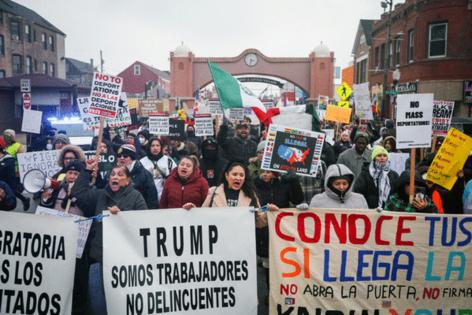Commentary: Trump's remittance tax is a cruel double-tax on immigrant's dignity
Published in Political News
Every week, millions of immigrants in the United States wire money across borders to their families and hometowns, not because they can afford to, but because they have to. Those funds can mean food on the table, payment of school fees or medicine for someone sick.
Now, President Donald Trump and the Republicans want to impose a burdensome tax on those remittances, as part of the big, ugly bill that recently passed the House of Representatives.
The Senate version of this section of the bill, which was released Monday, still contains a 3.5% tax on remittances, but with new loopholes. It now applies mostly to noncitizens paying for remittances in cash — a regressive tax on poorer and underbanked immigrants.
When immigrants send money abroad, it’s not just for their parents or kids; it also keeps whole communities standing. It might help rebuild a school or buy an ambulance for the town’s hospital. Even with limited funds, immigrants find a way to pool money and send what they can because someone is counting on it — sometimes a parent, sometimes an entire village. Remittances aren’t a luxury; they’re a lifeline.
Estimates show immigrants pay nearly $580 billion in federal, state and local taxes yearly; unauthorized immigrants alone pay approximately $100 billion, and that doesn’t even include the millions of U.S.-born citizens with immigrant families. Meanwhile, the 400 wealthiest families in our country pay a lower tax rate than the average American.
In 2024, Elon Musk’s company Tesla paid zero dollars in federal income tax, despite reporting $2.3 billion in income. Between 2013 and 2018, the combined wealth of 26 of the richest billionaires grew by $500 billion; they paid only $24 billion in federal income taxes.
Taxing remittances doesn’t just reduce the amount of hard-earned money that gets sent. It also reduces financial stability for families in countries such as Mexico, India, Nigeria and the Philippines. In many of the receiving countries, those dollars go further than foreign investment, often reaching people and communities that banks and governments don’t.
For countless families, remittances are the only safety net they have. Taxing them only adds pressure, driving families deeper into poverty, forcing more people to leave home, and fueling the very displacement and migration Republicans claim they want to stop.
If remittances become too expensive or hard to send, people won’t stop sending them; they’ll just be pushed toward riskier ways of doing it. That means using unregulated apps, handing off cash to couriers or trusting someone down the block who “knows a guy.” And that’s when scams, theft and predatory fees become prevalent. It also opens the door for organized crime to fill the gap, stepping in where governments fall short and gaining influence not just abroad, but here in the U.S.
When you tax dignity, you don’t just take money. You push people into danger.
This is a double tax on the people who do some of the hardest jobs in this country with meager salaries and the least labor protections. While billionaires exploit tax loopholes, this administration wants to hand the bill to the essential workers — the people doing work that keeps this country going.
This is part of a steady campaign to make life harder for all working families. We’ve seen it in the cuts to Medicaid, Medicare, and food assistance programs such as the Supplemental Nutrition Assistance Program, and in the constant political attacks that turn immigrant identity into something to fear. This tax has to be rejected in its entirety. It should never have been added to the bill, and its passage in the House is an insult to all those who work hard to keep our country running.
That’s why I’m calling on my colleagues in the House and Senate to oppose this tax in the final version of the bill. If this administration cared about reducing migration, it wouldn’t be making life harder for the families migrants leave behind.
Immigrants already meet their financial obligations here. They should have the freedom to use their hard-earned money as they choose — whether it’s sending it to rebuild a bridge or buy medicine for their mothers.
If we’re serious about fairness, we should be taxing billionaires, not the people who clean our offices, care for our elders and carry this economy on their backs.
_____
_____
©2025 Chicago Tribune. Visit at chicagotribune.com. Distributed by Tribune Content Agency, LLC.

























































Comments